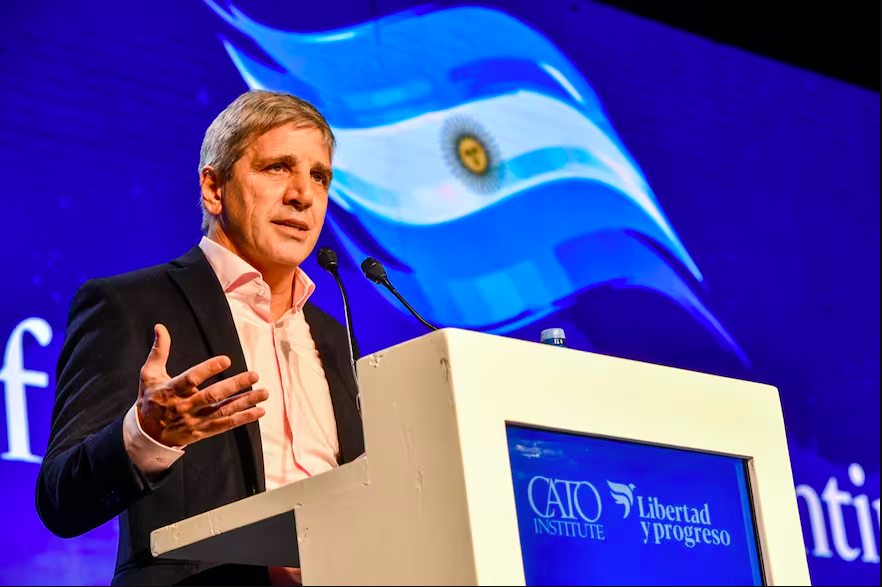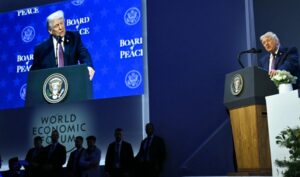
Published 06/11/2024 17:21 | Edited 06/11/2024 17:34
This Tuesday (11), the Minister of Economy, Luis Caputo, attributed responsibility for the recent rise in the dollar to the opposition and denied that the country is facing an economic crisis, despite evidence of a significant increase in parallel dollar prices, which reached 1,300 dollars. Country risk rose 246 basis points (19.7%), reaching the highest value in the last three months, after sovereign debt obligations accumulated falls of up to 13%.
During an event held at the Hilton Hotel, Caputo expressed optimism regarding the approval of a disbursement of US$800 million by the Board of Directors of the International Monetary Fund (IMF), scheduled for this Thursday (13). The minister also announced his intention to launch a new economic program amid exchange rate tensions and uncertainties about the Basic Law, which will be discussed this Wednesday in the Senate.
Caputo’s speech, which emphasizes a “heavy legacy” and the opposition’s responsibility for current problems, can be interpreted as a strategy to divert attention from government failures. Comparisons with past crises, such as Rodrigazo and the hyperinflation of the 1980s, serve to dramatize the inherited situation, but also to justify the lack of substantial progress in its management.
Read also: Worse than the recession is the currency crisis that Milei faces in Argentina
Recession in Argentina shakes the domestic market, despite fiscal surplus
Javier Milei’s troubled path to the Argentine presidency
He bets on a narrative of a “calamitous situation” encountered upon taking office, comparing the scenario to past crises, such as the hyperinflation of Alfonsín and Menem and the 2001 crisis. He praised Milei for achieving a fiscal surplus since the first month of government, reducing a deficit of five percentage points, despite having done so by defaulting on civil servants, retirees and universities. Caputo also defended the reduction of tax rates and promised future measures to adjust the economy.
“What happened in the market is that politics will try to get in the way, but don’t get carried away by that. The macroeconomy is orderly,” said Caputo, referring to the way in which Congress has forwarded its proposal for the Omnibus Law, which reforms the economy. He highlighted the solidity of the national economy, mentioning fiscal, commercial and current account surpluses, the sum of defaults in different sectors of society.
Currency tensions and volatility
Although Caputo minimized exchange rate tensions, attributing the volatility to the political scenario, the reality is more complex. The rise in the dollar and the increase in country risk reflect a lack of confidence in the government’s ability to stabilize the economy. Dependence on IMF disbursements highlights a structural fragility that cannot be ignored. The promise of a new program with the IMF, without concrete details, sounds like another attempt to buy time and avoid immediate panic.
At the end of May, Argentine economist Eduardo Crespo, professor at the Federal University of Rio de Janeiro (UFRJ), highlighted to the Red Portal, that the exchange rate crisis, with an accelerated and strong fall in the national currency, worsens the macroeconomic management situation for the Milei government. “This is an announcement that there is an expectation that the situation is more complicated than previously known.”
Crespo highlighted that the increase in the values of parallel dollars, such as the blue dollar and the MEP dollar (Electronic Payment Market), is an indicator of an expected worsening of the economic situation, which could become an obstacle for Milei to achieve her goal of remove exchange controls.
The Central Bank’s interest rate reduction, which took place in mid-May, ended up marking a before and after in market sentiment. The cut was steeper than expected, from 133% to 40%, a decision that ended up collapsing the expectations of investors, who lost the incentive to remain in pesos. Since then, free dollars have traded higher and financial assets have turned red, a trend that has deepened in recent weeks following increased political noise in Congress.
The minister defended the reduction of rates to 40% nominal annually, arguing that this measure is necessary to decompress credit. He emphasized the need for confidence in the proposed economic model and asked for support from the businesspeople present at the event. “They have to empower themselves, if they are convinced, the economy will begin to recover quickly, we will return the surplus we have in lower taxes,” he promised.
Caputo minimized concerns about exchange rate tensions, assuring that “it doesn’t scare me, there will be no crisis”. He attributed the volatility to the political scenario, lamenting that “May was a spectacular month before this political attack.” According to the minister, before the recent turmoil, the country’s risk was at 1,200 points and the dollar was priced at US$1,100, with a record fiscal surplus and a significant drop in inflation.
Betrayals of the IMF
Caputo’s attempts to bring calm to markets are not new. He has been trying for months to get the IMF to release funds, but without the expected results: in April he demanded US$15 billion to ease external accounts and improve the prospect of exiting the exchange rate. The international organization congratulated him on the results of the economic program and nothing more.
Caputo expressed confidence in the approval of the disbursement of 800 million dollars by the IMF and indicated that a new program with the entity has been under development since August last year. The Government hopes that this money will help them fulfill their promise to “get out of the exchange rate trap”. “From then on we will start talking about a new program, we have had it since August last year, it will not be new and we will wait with this new program, money will probably arrive”, he explained.
This expectation reflects an excessive dependence on external financing to keep the economy afloat. Without structural reforms and a clear economic policy, confidence in the market remains low.
Future measures and business support
Caputo also addressed the issue of public works, defending the transfer of these responsibilities to the provinces. However, this policy has been criticized for paralyzing essential projects, exacerbating the crisis in the construction sector, which recorded a 37.2% drop in April. Gustavo Weiss, president of the Argentine Chamber of Construction, warned that the current situation is “much worse than that of 2001”, highlighting the need for an economic development plan, in addition to fiscal adjustment.
Caputo downplayed the importance of immediate approval of the Basic Law, suggesting that the economy will accelerate with or without the law. He predicted a significant victory for the president in the next elections, with 60% to 70% of the votes. “The exit is tough, but safe, we will not let ourselves be carried away by the fact that 30 do not approve in the Senate,” he added.
While Caputo defended his policies, the climate of social discontent grew. Protests by unions, social movements and opposition parties marked the discussion of the Basic Law in the Senate on this day, reflecting popular resistance to the adjustment measures proposed by the government. The criticism from the governor of Buenos Aires, Axel Kicillof, and the mobilization of various sectors reinforce the perception that current policies do not have broad popular support.
Caputo’s rhetoric, marked by optimism and blaming the opposition, contrasts sharply with the country’s economic reality. The rise in the dollar, the crisis in the construction sector and dependence on external financing are clear signs of a weakened economy. Confidence in the government is shaken, and promises of future IMF disbursements appear insufficient to resolve deep structural problems. Without a clear economic development plan and substantial reforms, Argentina remains in a state of uncertainty and volatility.
What happens with the Basic Law this week in the Senate, the liquidations of agricultural exporters, negotiations with the International Monetary Fund (IMF) and debt payments could define the market’s mood in the coming weeks.
Source: vermelho.org.br

